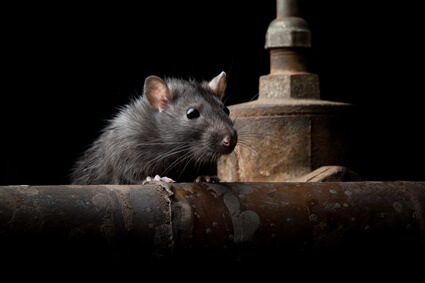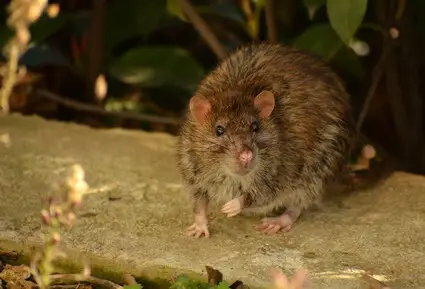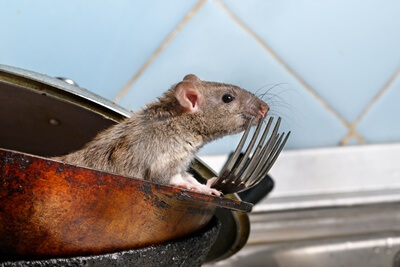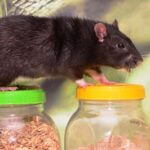Rats have well-developed olfactory senses. Before a rat enters your home, it can smell any waste or leftover food. This is often what draws a rat to gain entrance to your home.
A rat’s sense of smell utilizes its 1,700 olfactory receptors. Their sense of smell is 5 times better than a human’s and superior to a mouse’s 1,300 olfactory receptors.
Rats use their sense of smell to find food, locate shelter, detect changes in the weather, communicate, create trails, and find mates.
Of course, a rat’s sense of smell can be disadvantageous, as it can be disturbed by strong smells. Mothballs, peppermint, bleach, and other potent scents are abhorrent to rats.
Do Rats Have a Strong Sense of Smell?
The olfactory senses of rats enable them to detect the smell of food from far away, which is usually what draws them to homes in the first place.
Rats also use their sense of smell to detect the pheromones of predators in their environment, enabling them to steer clear of impending danger.
Rats can detect changes in the environment through scent. For example, when the temperature drops suddenly, rats can detect this change and know to seek out shelter.
Rats have poor vision, so they rely on their olfactory senses in these situations:
Locating Food Sources
Rats can pick up the odor of food, even from a distance away. This allows them to follow the scent trail directly to much-needed food sources.
Rats can detect food waste in garbage bins and compost pits. So, it’s no surprise that these are the locations where rats head when they enter people’s properties.

Detecting Predators
Rats can detect the pheromones of predatory animals via their urine, staying away from areas where there’s a high likelihood that danger may be lurking.
The Journal of Neuroscience found that rats experience a spike in stress hormones when exposed to pheromones from the urine of predators, including cats and ferrets.
Temperature Changes
The olfactory receptors of rats are sensitive to climatic conditions, detecting small temperature changes.
This is invaluable for survival because it signals rats to seek warm shelter when temperatures drop. They can also find spots to cool themselves when the temperatures get too high.
Without this ability, rats could die from exposure to extreme weather conditions.
Reproduction
A rat’s strong sense of smell is crucial for reproduction and the propagation of the species.
When a female rat is in heat, she releases pheromones, which attract male rats. Her potential mates can be drawn in from a mile away.
Also, male rats tend to sniff at females to bring them in heat, so they’re more receptive to mounting.
Communication
Rats also use their noses to communicate with other members of their species.
Rodents are social animals by nature and live in packs consisting of hundreds of members. So, the ability to communicate is essential to their survival.
Rats communicate through chemical signals (pheromones), which are detected by olfactory receptors. The odors and secretions released by different body parts are decoded by other rats.
A rat can identify another rat based on the pheromones in its urine. Is it female? How old is it? How healthy is it? Where has it been? These are all questions that can be answered based on smell.
How Well Can Rats Smell?
The number of olfactory receptors implies a highly developed sense of smell. Rats can pick up on scents behind walls and differentiate between various scents.
For example, rats can tell the difference between the pheromones of fellow rats and dangerous predators, such as cats, snakes, and ferrets.
Rats have a superior sense of smell, capable of picking up on scents that humans can’t.
Can Rats Smell Food From Far Away?
Due to their sensitive noses, rats can pick up on the smell of food from a long distance.
They need to forage for food in the wild, often when it’s scarce or difficult to find. Their powerful olfactory senses are crucial to their survival.
Can Rats Smell Food Through Walls?
Rats can pick on the smell of food through walls, which is often what attracts them to people’s homes.
They’ll detect food odor in kitchens and pantries and pick up on the smell of food waste in garbage bins. This can happen regardless of whether the rat has entered the home.
If you have any food lying around, rats will be able to smell it.

What Smells Do Rats Dislike?
The smells rats find unpleasant include the following:
- Mothballs (naphthalene)
- Peppermint
- Vinegar
- Garlic
- Onions
- Lavender
- Eucalyptus
- Predators
Can Rats Smell You?
Rats can pick up on various scents, including food, predators, and humans.
Rats are terrified of us due to our size and movements. Rats will scurry off into hiding as soon as they detect your presence.
Your scent may be the first warning a rat gets before hearing or seeing you.
Can Rats Smell Poison?
Rats can detect the smell of poison, although this does little to deter them from eating it.
Most rodenticides contain organic matter, such as animal fats. These smells lure rats to ingest the poison, ignoring their better instincts or confusing them about the true meaning behind the smell.
Rats can develop bait shyness, especially if other rats have died from eating the same bait. Consequently, surviving rats may evade future baits.
Can Rats Smell Other Rats?
Rats can pick up on the scent of predators and smell the pheromones of other members of their species.
This is important as it makes it possible for males to detect females in heat. Rats also use the distinct smell of different pheromones to identify other rats and communicate with each other.
Can Rats Smell Dead Rats?
Rats can detect the smell of dead rats and will cannibalize their dead to prevent the smell from attracting predators. Where food is scarce, rats will do this to avoid starving.
This means that the smell of a dead rat is likely to attract more rats to your home.
Rats have an amazing sense of smell. They use this ability to do everything from increasing their chances of survival to finding new mates to becoming better foragers.








